Related Research Articles

The First Lady of Chile is the title for the wife of the president of Chile, who is traditionally responsible for directing and coordinating activities in the social field of the presidency and also accompany the president in ceremonies or official activities, for example, on state visit. Although not an official title, it is widely used in formal protocol and has been used in some decrees.
Olga Nolla was a Puerto Rican poet, writer, journalist, and professor.
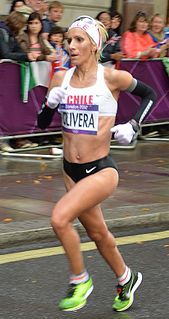
Érika Alejandra Olivera de la Fuente is a female marathon runner from Chile and deputy for the National Renewal party. She has competed at five Olympic Games, the most Olympic appearances ever by a female marathon runner.

Hermila Galindo Acosta was a Mexican feminist and a writer. She was an early supporter of many radical feminist issues, primarily sex education in schools, women's suffrage, and divorce. She was one of the first feminists to state that Catholicism in Mexico was thwarting feminist efforts, and was the first woman to run for elected office in Mexico.

Elena Salgado Méndez is a Spanish politician of the Spanish Socialist Workers' Party (PSOE) who served as Deputy Prime Minister of Spain and held several ministerial portfolios during her political career.
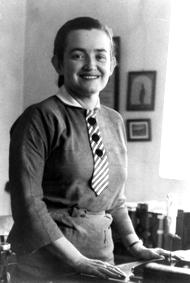
Josefina Valencia Muñoz was a Colombian politician, and the first woman to be appointed governor of a Colombian department as Governor of Cauca, and the first woman to be appointed to a cabinet-level position as the 46th Minister of National Education of Colombia.

Content in this edit is translated from the existing Spanish Wikipedia article at Lenka Franulic; see its history for attribution.

Elena Caffarena Morice was a Chilean lawyer, jurist and politician. Contemporary historians and humanists consider her to be one of the most important 20th-century public figures in Chile.
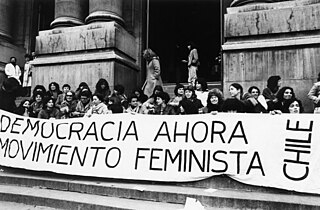
Feminism in Chile has its own liberation language and activist strategies for rights that is shaped by the political, economic, and social system of Chile. Beginning in the 19th century, Chilean women have been organizing with aspirations of asserting their political rights. These aspirations have had to work against the reality that Chile is one of the most socially conservative countries in Latin America. The Círculo de Estudios de la Mujer is one example of a pioneering women's organization during the Pinochet dictatorship (1973–1989) which redefined women's responsibilities and rights, linking “mothers’ rights” to women's rights and women's civil liberties. The founding members of the Círculo de Estudios de La Mujer consisted of a small group of Santiago feminists who were from the Academia de Humanismo Cristiano. These women gathered "to discuss the situation of women in Chile," their first meeting drew a crowd of over 300 participants and from there challenged the authoritarian life in Santiago. These women helped shape the rights for women in Chile.
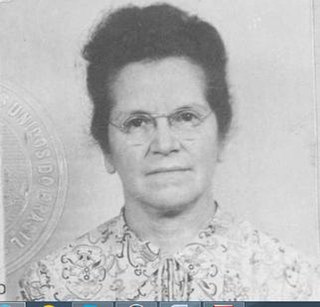
María Rivera Urquieta was a Chilean professor and feminist. She was one of the founding members of the Pro-Emancipation Movement of Chilean Women. She was a lecturer for the Chilean Federation of Feminine Institutions and led one of the conference meetings at the Primer Congreso Interamericano de Mujeres held in Guatemala City, Guatemala in 1947.

Marta Vergara Varas was a Chilean author, editor, journalist and women's rights activist. Introduced to international feminism in 1930, she became instrumental in the development of the Inter-American Commission of Women (CIM) helping gather documentation on laws which effected women's nationality. She pushed Doris Stevens to broaden the scope of international feminism to include working women's issues in the quest for equality. A founding member of the Pro-Emancipation Movement of Chilean Women, she was editor of its monthly bulletin La Mujer Nueva. When she was ousted from the Communist Party she moved to Europe and worked as a journalist during the war. At war's end, she returned to Washington, D.C. and worked at the CIM continuing to press for women's suffrage and equality, before returning to Chile, where she resumed her writing career.
Pro-Emancipation Movement of Chilean Women was both a historic women's rights organization, which pressed for equality between 1935 and 1953 and a current umbrella organization reorganized in 1983 to organize other women's organizations to provide unity in the struggle for the country to return to democracy. Once the dictatorship was overturned the NGO turned their focus to uniting organizations which pursue a broad spectrum of issues pertaining to women's rights and development.

Constanza Valdés is a trans female Chilean political activist and parliamentary advisor.
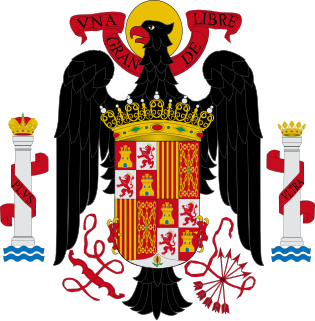
Women's suffrage in Francoist Spain and the democratic transition was constrained by age limits, definitions around heads of household and a lack of elections. Women got the right to vote in Spain in 1933 as a result of legal changes made during the Second Spanish Republic. Women lost most of their rights after Franco came to power in 1939 at the end of the Spanish Civil War, with the major exception that women did not universally lose their right to vote. Repression of the women's vote occurred nevertheless as the dictatorship held no national democratic elections between 1939 and 1977.

Justicia Espada Acuña Mena was a Chilean civil engineer. Justicia was the first woman civil engineer in Chile.
Women's suffrage in Chile was introduced on the communal level in 1935, and on national level on 8 January 1949. It was the product of a long period of activism, tracing back to 1877, when women were allowed to attend university, a reform which stimulated the formation of a women's movement. The women's suffrage was a reform which was actively promoted since the 1920s by the organizations Comité Nacional pro Derechos de la Mujer, Pro-Emancipation Movement of Chilean Women and Federación Chilena de Instituciones Femeninas (FECHIF).

Celinda Arregui de Rodicio was a Chilean feminist politician, writer, teacher and suffrage activist best known for her work in favor of the rights of women in the political, social and civil spheres in Chile.
Olga Ida Magdalena Grau Duhart is a contemporary Chilean writer, full professor, and philosopher, a specialist in gender, sexuality, philosophy, education, and literature.
References
- ↑ Olga Boettcher M.: primera mujer gobernadora en Chile y en América: (memorias). Olga Boettcher M. 1993